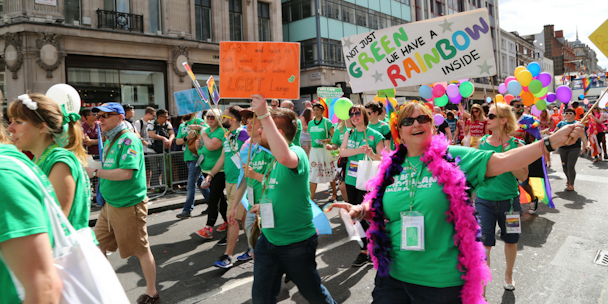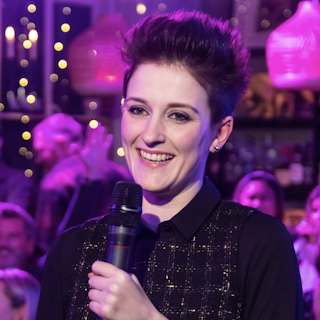How Pride in London's marketing director is connecting brands to the LGBTQ+ cause
The Drum spoke to Pride in London's marketing director about how the annual LGBTQ+ event has evolved, how her team promote experiential marketing to brands and how marketing that supports the Pride cause needs to be backed up by real substance..

How Pride in London's marketing director is connecting brands to the LGBTQ+ cause
Pride In London has been going in its current format since 2013, when Quadrangle's deputy chairman and joint managing partner, Alison Camps, took over the organisation.
The original LGBTQ+ festival was founded 45 years ago but ran into financial difficulties before Camps and her team acquired its rights. The brand Pride in London was created and the group started to build an event from scratch with only an £100,000 grant from the Mayor of London. The rest of its finances are raised through corporate sponsorship and fundraising.
Collaborating with brands
For the annual event, which takes place in July, collaborating with brands is essential to success. Camps explains that there are two fundamental ways in which Pride in London collaborates to bring in the right names and makes sure they focus on diversity and inclusion.
“The way that we engage with brands is by emphasising diversity and inclusion, which is a hot topic for many employers," she says.
“There are a few points of entry in terms of building those relationships: either through their marketing department, because they see value in either targeting the audience we see plus market; because they believe that promoting diversity and inclusively through their brand is an important thing to do; or we engage with them though their diversity and inclusion deviations.”
Pride in London relies on this sponsorship, as closing down half of London does not come cheap.
Camps explains: “It's quite some feat to raise that amount of money to put on the event. It's about having an evidence-based case in terms of the difference we make, the number of people we reach and what we can enable and deliver for them regarding our own community, networks and messaging.
“We do this through our own social media platforms, which are very well established, but also through our great relationships with London's media companies and the marketing, advertising and out of home campaigns every year.”
Making better connections
Experiential marketing has proven to create better connections with audiences. But although events and experiential budgets are rising frequently, not enough attention is drawn towards it compared to above the line marketing, Camps believes.
“It's a case of needing to think about engaging your audience in the sense of 'and' not 'or'," she explains. “In today's world, the way we consume advertising messages and the way we engage with brands has so fundamentally changed because of digital. We have learned to engage with brands very differently as a result of, primarily, social media, so it must be nigh on impossible to isolate the impact of any one medium over another.
“Above the line will always have the cash because of the presence, the reach and the visibility to large numbers of people. The power of experiential gives you an opportunity to go much deeper with your target consumer and to develop a different kind of engagement."
She adds: “The job of advertising is about keeping my brand on people's radar, making sure that people are aware of it and hopefully prompting them to put me on the consideration list. Then other forms of marketing might be better at converting that consideration into preference.”
Getting brands on board
During the festivities, many brands that promoted the infamous rainbow colours endured ridicule, more so than previous years. Camps explains that it was great that more brands wanted to be a part of Pride and share support for LGBTQ+ equality.
She explained: "We want Pride in London to be a focal point for the whole of London – and beyond – so we are glad to see engagement on the rise. That said, I think it needs to be backed up by real substance, by which I mean a demonstration of how brands are promoting the aims of pride in practice – not just in pride ‘season’, but all year around.
"And that includes financial support – it costs nearly £1m to organise the UK’s biggest LGBTQ+ festival, and we bring people and money into the West End, which is why we are incredibly grateful to sponsors like Barclays, Starbucks and Tesco, as well as the Mayor of London, without whom Pride in London just would not happen."
Her personal view is that there it isn't enough for a brand to just dress up their windows with rainbows or say that they support Pride in London.
"Do you?" she asks. "Show me how. What happened to Primark at Manchester Pride [not donating any profits from its Pride range to charity] is evidence of the importance of this. The other thing we need to remember is that Pride began and belongs to the LGBTQ+ community. Its roots are in protest, and for as long as inequality exists protest must remain at its core.
"There is of course also place to celebrate our progress and successes, but we are fooling ourselves if we think the job is done. Brands need to be sensitive to that in the way they engage, or they risk alienating the people they say they want to support."
Monitoring success
The advertising campaign for Pride, Love Happens Here, gained some traction from the public following quotes that were published. Pride In London responded to this with haste.
Camps says: "The advertising campaign was designed to reach all Londoners, not just LGBTQ+ Londoners, showing how love can and does overcome prejudice. Of more than 30 poster executions, we received some negative feedback about four in particular and decided to remove them as our intent was to promote a message of unity and there was clearly a group of people – albeit small – who thought we had missed the mark."
Pride in London monitors responses to all their campaigns closely, and the overall results from 2017 were overwhelmingly positive.
Camps says: "Love Happens Here was the biggest campaign we have run to date, and we achieved a numbers of ‘firsts’ – including the first TV ads to focus on biphobia and transphobia, and a Pride in London ‘takeover’ of Times Square at New York Pride. That all of this is delivered by a team of volunteers – with the fantastic support of WCRS, of course – is, I think, remarkable if not miraculous.
"Next year, as in previous years, we will be consulting on our strategic brief and creative concepts before we move into campaign development. We are unlikely to please all of the people all of the time, but we will do our best to do due diligence on what our message is going to be, and how we implement that."
Camps is a judge for The Drum UK Event Awards. The ceremony will take place on Tuesday 5 December at the Marriott Hotel, Grosvenor Square, London. Tickets are now available to purchase online.
This event recognises and rewards those often behind the scenes within the event industry, with a focus on the experiential element of the marketing world.
Sponsors for the event are: JLA, EFX, TINT, The Drum Network and The Drum RAR.

